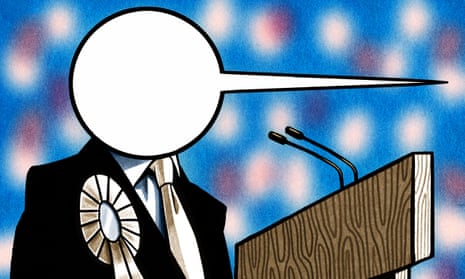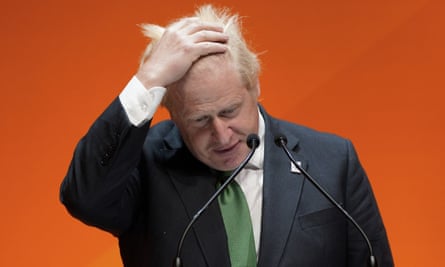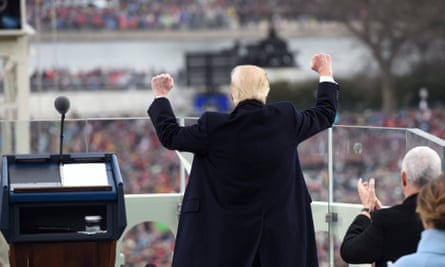 I
Illustration: Ben Jennings/The Guardian
Sometimes it falls to an old book to tell us what’s new, to a white-bearded philosopher based far from Westminster or Washington to clarify the shifts in our sharp-suited politics. So spare yourself the annual round-ups in the newspapers or the boy-scout enthusiasm of podcasters. To understand the great political shift of this year, the work you need is a piece of philosophy called – what else? – On Bullshit.
I offer it to you this Christmas because surely no reader of mine can resist an essay that begins: “One of the most salient features of our culture is that there is so much bullshit. Everyone knows this.” Statements like that made it a bestseller upon re-publication in 2005 and turned its then-75-year-old author, Harry Frankfurt, from a distinguished moral philosopher at Yale and Princeton into a chatshow guest.
But to open the book now is to get a blast of something quite different, in a climate that just didn’t exist two decades ago. Read today, On Bullshit taxonomises an entire style of government. It foretells the age of Donald Trump and Boris Johnson.
The task Frankfurt sets himself is to define bullshit. What it is not, he argues, is lying. Both misrepresent the truth, but with entirely different intentions. The liar is “someone who deliberately promulgates a falsehood”. He or she knows the truth or could lay hands on it – but they certainly aren’t giving it to you. The bullshitter, on the other hand, “does not care whether the things he says describe reality correctly. He just picks them out, or makes them up, to suit his purpose.” Bullshitters couldn’t give two hoots about the truth. They just want a story.
In that distinction lies an explanation for this era of politics. Commentators have struggled for years to coin the phrase for now. “Populist” doesn’t work. Too often, it merely denotes what the author and their friends dislike, throwing together clowns such as Beppe Grillo with social democrats such as Jeremy Corbyn. A similar problem bedevils “strongman”, a label stuck on Xi Jinping and Jair Bolsonaro alike. But “bullshitter” – that sums up just how different Trump and Johnson are from their predecessors.
Sometimes it falls to an old book to tell us what’s new, to a white-bearded philosopher based far from Westminster or Washington to clarify the shifts in our sharp-suited politics. So spare yourself the annual round-ups in the newspapers or the boy-scout enthusiasm of podcasters. To understand the great political shift of this year, the work you need is a piece of philosophy called – what else? – On Bullshit.
I offer it to you this Christmas because surely no reader of mine can resist an essay that begins: “One of the most salient features of our culture is that there is so much bullshit. Everyone knows this.” Statements like that made it a bestseller upon re-publication in 2005 and turned its then-75-year-old author, Harry Frankfurt, from a distinguished moral philosopher at Yale and Princeton into a chatshow guest.
But to open the book now is to get a blast of something quite different, in a climate that just didn’t exist two decades ago. Read today, On Bullshit taxonomises an entire style of government. It foretells the age of Donald Trump and Boris Johnson.
The task Frankfurt sets himself is to define bullshit. What it is not, he argues, is lying. Both misrepresent the truth, but with entirely different intentions. The liar is “someone who deliberately promulgates a falsehood”. He or she knows the truth or could lay hands on it – but they certainly aren’t giving it to you. The bullshitter, on the other hand, “does not care whether the things he says describe reality correctly. He just picks them out, or makes them up, to suit his purpose.” Bullshitters couldn’t give two hoots about the truth. They just want a story.
In that distinction lies an explanation for this era of politics. Commentators have struggled for years to coin the phrase for now. “Populist” doesn’t work. Too often, it merely denotes what the author and their friends dislike, throwing together clowns such as Beppe Grillo with social democrats such as Jeremy Corbyn. A similar problem bedevils “strongman”, a label stuck on Xi Jinping and Jair Bolsonaro alike. But “bullshitter” – that sums up just how different Trump and Johnson are from their predecessors.

‘Bullshit is where newspaper stories about Italians demanding smaller condoms meet plans for an airport on an island in the Thames.’ Photograph: Peter Byrne/PA
Some enterprising future editor of a dictionary of political terms will carry the word “bullshit” and cite as examples: writing two opposing columns on Brexit, claiming the NHS will be £350m a week better off and affecting a hurt expression when asked the whereabouts of your promised 40 new hospitals. Come on! Those little-doggy eyes beseech the hard-faced TV interviewer. Didn’t everyone know that was bullshit?
Socially, there is little to distinguish Johnson from David Cameron: both are Bullingdon boys manufactured at Eton. In policy, too, there is a fair carryover between George Osborne’s “northern powerhouse” and Johnson’s “levelling up”, or between Cameron’s vow to get net immigration down to the tens of thousands and the pledges made by Johnson’s home secretary, Priti Patel. The great divide is in rhetoric: how Johnson talked to voters and the promises he made us. They were never meant to be taken at face value.
Among the media class’s artisanal industries of the past few years has been trying to find a thread that runs through Johnson the journalist, the globalist mayor of London and the Brexit prime minister. Frankfurt furnishes that link: it is bullshit.
Bullshit is where newspaper stories about Italians demanding smaller condoms meet plans for an airport on an island in the Thames meet promises of an “oven-ready” Brexit deal. They are electioneering fables rather than manifesto commitments, grand gestures over small print, cheerful dishonesty in place of lawyered mendacity. In other words, they are all just careerist bullshit.
Much the same goes for Liz Truss, although she was clearly not as good at it. Looking back, this summer’s Tory leadership contest can be seen as a final hurrah for the “anything goes” era. And it certainly applies to Trump. “I will build a great, great wall on our southern border, and I will have Mexico pay for that wall.” Bullshit. “Sorry losers and haters, but my IQ is one of the highest.” Bullshit. A “sea of love” at his inauguration that broke all records. Bullshit, bullshit, bullshit. Frankfurt’s book offers a theory of a generation of politicians who now appear to be leaving the stage.
Some enterprising future editor of a dictionary of political terms will carry the word “bullshit” and cite as examples: writing two opposing columns on Brexit, claiming the NHS will be £350m a week better off and affecting a hurt expression when asked the whereabouts of your promised 40 new hospitals. Come on! Those little-doggy eyes beseech the hard-faced TV interviewer. Didn’t everyone know that was bullshit?
Socially, there is little to distinguish Johnson from David Cameron: both are Bullingdon boys manufactured at Eton. In policy, too, there is a fair carryover between George Osborne’s “northern powerhouse” and Johnson’s “levelling up”, or between Cameron’s vow to get net immigration down to the tens of thousands and the pledges made by Johnson’s home secretary, Priti Patel. The great divide is in rhetoric: how Johnson talked to voters and the promises he made us. They were never meant to be taken at face value.
Among the media class’s artisanal industries of the past few years has been trying to find a thread that runs through Johnson the journalist, the globalist mayor of London and the Brexit prime minister. Frankfurt furnishes that link: it is bullshit.
Bullshit is where newspaper stories about Italians demanding smaller condoms meet plans for an airport on an island in the Thames meet promises of an “oven-ready” Brexit deal. They are electioneering fables rather than manifesto commitments, grand gestures over small print, cheerful dishonesty in place of lawyered mendacity. In other words, they are all just careerist bullshit.
Much the same goes for Liz Truss, although she was clearly not as good at it. Looking back, this summer’s Tory leadership contest can be seen as a final hurrah for the “anything goes” era. And it certainly applies to Trump. “I will build a great, great wall on our southern border, and I will have Mexico pay for that wall.” Bullshit. “Sorry losers and haters, but my IQ is one of the highest.” Bullshit. A “sea of love” at his inauguration that broke all records. Bullshit, bullshit, bullshit. Frankfurt’s book offers a theory of a generation of politicians who now appear to be leaving the stage.

‘A ‘sea of love’ at Donald Trump’s inauguration that broke all records. Bullshit.’ Photograph: Saul Loeb/EPA
Lies can be shown up: Saddam Hussein had no weapons of mass destruction. But there is no point factchecking bullshit, as parts of the British media still do over Brexit or the New York Times did with Trump. For a bullshitter, facts are beside the point – the real aim is to produce a story that erases the line between truth and falsehood. It’s why the philosopher concludes: “Bullshit is a greater enemy of truth than lies are.”
We all lie sometimes, and around millions of tables there will be much bullshit spoken over the Christmas turkey. In British politics, the era of bullshit followed on naturally from a long spell of lies. Before Johnson, the most effective Tory of the post-Thatcher era was Osborne.
He blamed Labour and Gordon Brown for the banking crash, only later admitting that was untrue. He declared Labour’s 2008 package to bail out the banks would spark a run on the pound, before confessing: “Broadly speaking, the government did what was necessary.”
Most of all, he claimed that slashing benefits was essential to bring down borrowing and was being done fairly. Remember “we are all in this together”? Except a study at the end of the coalition by the late John Hills, of the LSE, alongside other leading academics, showed that the coalition’s tax and benefit changes had “a net fiscal cost” – which meant they increased the deficit. Not only that, but “the poorest 30% [of Britons] lost or broke even on average and the top half gained”. Heading the Treasury, Osborne was in charge of a machine that could calculate the effects of his policies. He would have or should have known the truth as he laid out each budget. And yet voters were fed something entirely different.
One might see these as common or garden political lies – falsehoods that could be checked and that aimed at nothing more than establishing a poll lead for Osborne’s team. They were not the alternative reality of Vote Leave. But if the currency of truth is sufficiently debased, voters may eventually choose the altogether more entertaining humbugger. In that lies a warning for both Rishi Sunak, the down-to-earth multimillionaire, and Keir Starmer, the man who said he was Corbyn before revealing himself to be Tony Blair meets Gordon Brittas, the TV sitcom manager whose words never match results or deeds.
One topic Frankfurt doesn’t address is the audience for bullshit. Why do people buy it? To which we might add another question. Why have swathes of the political establishment and the press spent the past few years claiming Brexit is a success or that levelling up is serious or that any alternative to the most venal dishonesty is just impossible? Answers would be welcome but were we to press for any, I suspect we’d be told to drop the bullshit.
Lies can be shown up: Saddam Hussein had no weapons of mass destruction. But there is no point factchecking bullshit, as parts of the British media still do over Brexit or the New York Times did with Trump. For a bullshitter, facts are beside the point – the real aim is to produce a story that erases the line between truth and falsehood. It’s why the philosopher concludes: “Bullshit is a greater enemy of truth than lies are.”
We all lie sometimes, and around millions of tables there will be much bullshit spoken over the Christmas turkey. In British politics, the era of bullshit followed on naturally from a long spell of lies. Before Johnson, the most effective Tory of the post-Thatcher era was Osborne.
He blamed Labour and Gordon Brown for the banking crash, only later admitting that was untrue. He declared Labour’s 2008 package to bail out the banks would spark a run on the pound, before confessing: “Broadly speaking, the government did what was necessary.”
Most of all, he claimed that slashing benefits was essential to bring down borrowing and was being done fairly. Remember “we are all in this together”? Except a study at the end of the coalition by the late John Hills, of the LSE, alongside other leading academics, showed that the coalition’s tax and benefit changes had “a net fiscal cost” – which meant they increased the deficit. Not only that, but “the poorest 30% [of Britons] lost or broke even on average and the top half gained”. Heading the Treasury, Osborne was in charge of a machine that could calculate the effects of his policies. He would have or should have known the truth as he laid out each budget. And yet voters were fed something entirely different.
One might see these as common or garden political lies – falsehoods that could be checked and that aimed at nothing more than establishing a poll lead for Osborne’s team. They were not the alternative reality of Vote Leave. But if the currency of truth is sufficiently debased, voters may eventually choose the altogether more entertaining humbugger. In that lies a warning for both Rishi Sunak, the down-to-earth multimillionaire, and Keir Starmer, the man who said he was Corbyn before revealing himself to be Tony Blair meets Gordon Brittas, the TV sitcom manager whose words never match results or deeds.
One topic Frankfurt doesn’t address is the audience for bullshit. Why do people buy it? To which we might add another question. Why have swathes of the political establishment and the press spent the past few years claiming Brexit is a success or that levelling up is serious or that any alternative to the most venal dishonesty is just impossible? Answers would be welcome but were we to press for any, I suspect we’d be told to drop the bullshit.
